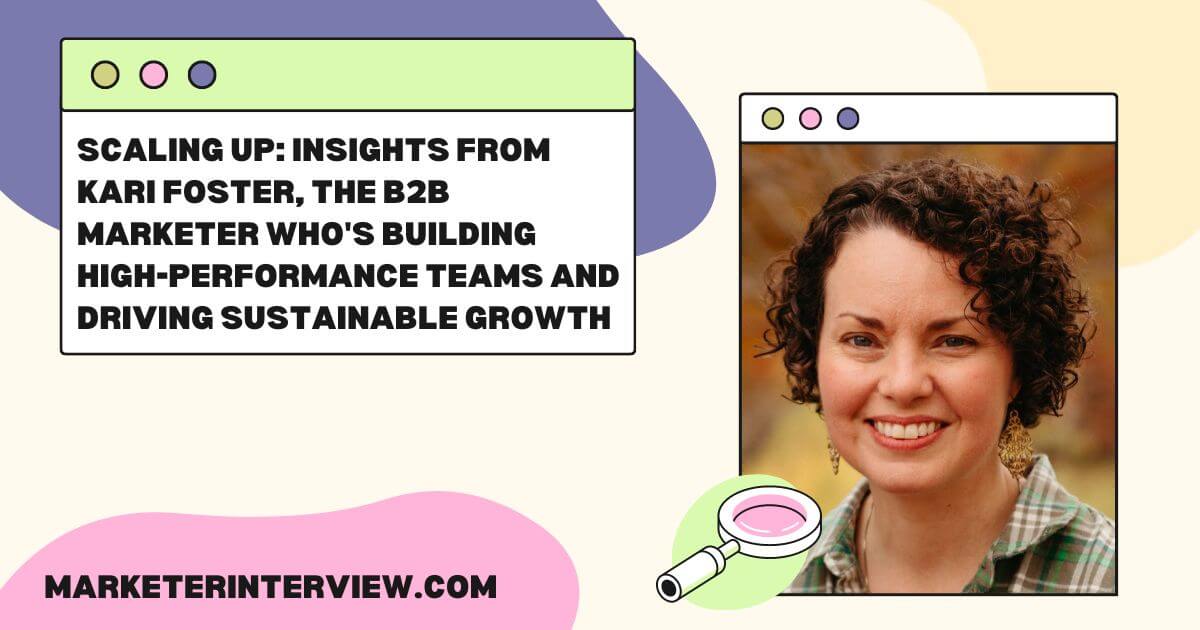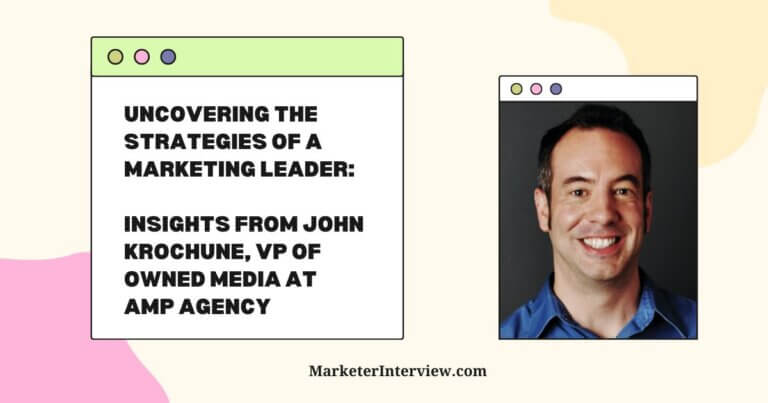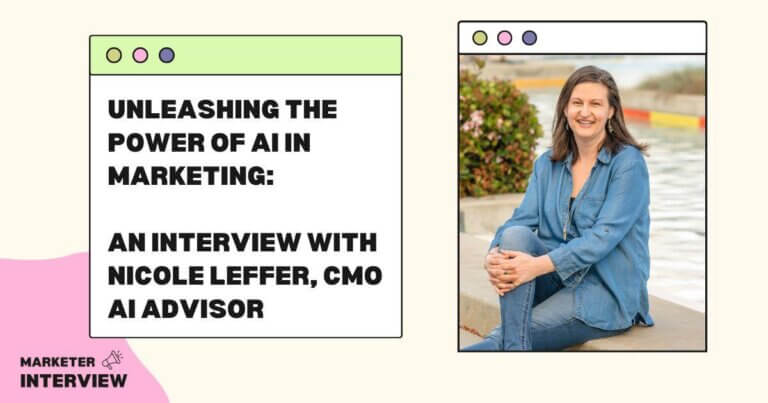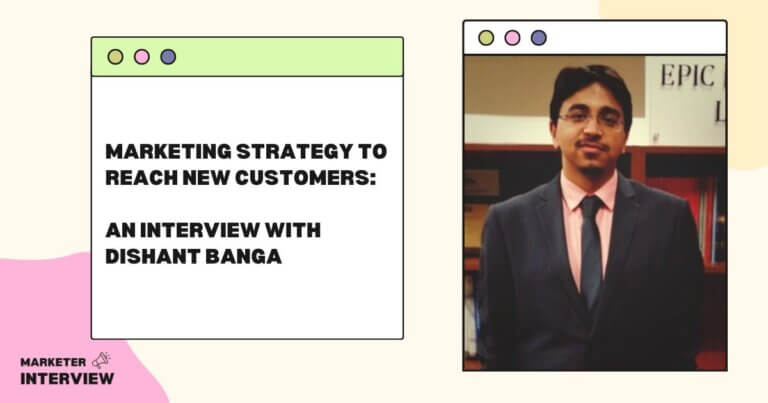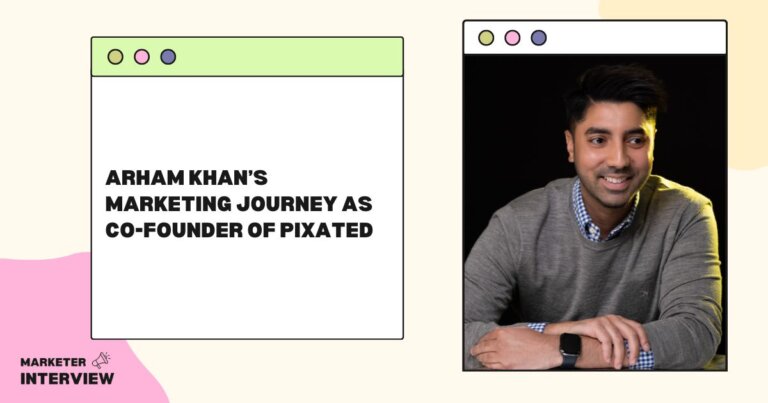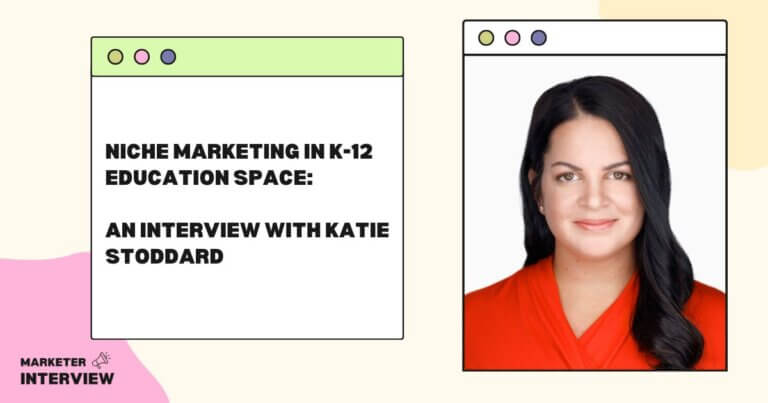Kari Foster, the B2B Marketer Who Builds High-Performance Teams
Welcome to Marketer Interview!
Today, we have the pleasure of speaking with Kari Foster, an accomplished B2B marketer who has helped numerous SaaS companies build scalable demand generation engines and achieve sustainable growth.
Kari’s expertise lies in building growth marketing muscle by leveraging data to construct integrated, full-funnel strategies targeting mid-market and enterprise businesses. With her wealth of experience in B2B technology and SaaS marketing, Kari is also an accomplished leader, having built and mentored highly productive teams and delivered on pipeline and revenue goals.
In this interview, we’ll be diving deep into Kari’s strategies for B2B lead generation, her insights on SaaS marketing, and her approach to building and leading high-performance teams.
Contents
- 1 How did you get started in the field of B2B marketing?
- 2 What are some of the biggest challenges you face when it comes to B2B lead generation for SaaS companies?
- 3 Can you share some examples of successful demand generation campaigns you’ve implemented for B2B SaaS companies in the past?
- 4 What role does data play in your approach to building scalable demand generation engines for B2B SaaS companies?
- 5 What are some common misconceptions about B2B marketing that you’ve encountered?
- 6 How do you stay up-to-date with the latest trends and best practices in B2B marketing?
- 7 What are some strategies you use to ensure that your B2B marketing campaigns resonate with mid-market and enterprise businesses?
- 8 What are some key metrics you track to measure the success of B2B marketing campaigns?
- 9 How do you build and lead high-performance teams in B2B marketing?
How did you get started in the field of B2B marketing?
Interestingly enough, I studied music education in college (I wanted to be a choir director!).
However, I would watch movies and TV shows that took place in advertising agencies and think, “Wow, that looks so cool!” So, just like that, I switched to Marketing and Communications (I still love singing and musical theater, though – choir geek 4 life!)
I was also starstruck by the dot-com boom of the early 2000s and wanted to be a part of that. I joined a small online community/e-commerce store for coffee lovers as their community manager/marketing manager.
That’s where my marketing career began. Over the years, it’s shifted from B2C to B2B, but it’s always been about technology.
What are some of the biggest challenges you face when it comes to B2B lead generation for SaaS companies?
I hear from many B2B marketers that they’re frustrated with an outsized emphasis put on top-of-funnel growth – and I’ve lived this myself (“We need more leads!!”).
In B2B SaaS, the past few years have been all about high-velocity growth at all costs. Now, there’s a shift in focus to profitability, and the request of marketing is the ever-popular “do more with less”.
(By the way, in startup land, this is ALWAYS the mantra.)
B2B marketers now have an opportunity to shift the focus away from wild and wooly top-of-funnel growth and More Leads Syndrome, to a more targeted and strategic approach that drives 1) pipeline velocity, and 2) customer retention.
Yes, top-of-funnel and new business acquisition is still important, but look across your entire funnel and customer lifecycle to identify other, more impactful (and profitable) growth levers to pull.
Ultimately, this is going to take lots of buy-in, coordination, and communication with Sales, Customer Success, and any other relevant function. That’s a different interview for a different day, though!
I’ve piloted 2 Account Based Marketing (ABM) programs at two different companies, and I learned a lot from both of those programs. The first one I launched had these specific characteristics:
- Total buy-in and close coordination with sales
- An intentional and highly targeted approach to building our target account list.
- A strategy that played upon our strengths (great product-market fit for the target segment) and wasn’t hindered by our weaknesses (lack of resources, both budgetary and headcount).
This program was successful for these reasons and contributed to a 142% increase in ACV. The framework was then used in support of a customer expansion initiative.
So here’s what I’ll say about ABM if you’re looking to pilot a program at your company. Don’t let lack of resources or specialized technology stop you. I was a team of one. We invested in an account intent data tool, but that was it. Do what you can with what you have, and don’t try to boil the ocean.
What role does data play in your approach to building scalable demand generation engines for B2B SaaS companies?
I worked at a marketing agency that was very data-oriented. I mean, we had to be because our clients expected it.
That’s where I really learned how to use data to make decisions and guide strategy. It’s funny because the whole reason I got into marketing was that I loved the creative aspect of it more than anything – math was NEVER my strong suit!
Now, B2B marketers (especially in demand, revenue, or growth-focused roles) are expected to make data-based decisions. We obsess over dashboards and pore over reports. I create marketing strategies based on which channels are performing well in terms of customer acquisition cost, average deal size, and pipeline impact.
That’s not to say there isn’t room for experimentation and trying new channels or strategies, but even then, the data you DO have should be used to inform which new channels to try.
For instance, are you seeing more SQLs and opportunities coming from self-reported dark social? Have you discovered your company is being mentioned by other companies or influencers in the space you could partner with?
What are some common misconceptions about B2B marketing that you’ve encountered?
Not necessarily about B2B marketing as a whole, but I’ve definitely encountered skepticism about what marketing does within the organization.
Everyone thinks they know marketing (we just make memes and send emails all day!), so they all have their 2 cents to offer, often in the form of “Why don’t we just do XYZ?” or “My friend/brother-in-law/niece/dog groomer does marketing, and they say TikTok works well.”
It’s frustrating, but I’ve countered it in a couple of ways:
- Share the strategy and communicate results often. Keep reminding of the strategy and results whenever others question it or want to add something to the mix.
- Keep an open mind and don’t get defensive (although I did have to get defensive once when co-workers didn’t understand why it was taking so long to select a marketing automation platform). Take ideas on board and say something like “Thanks for the idea! I’ll take that into consideration as I revisit the strategy.”
How do you stay up-to-date with the latest trends and best practices in B2B marketing?
- Podcasts: I could go on for days about podcasts because I follow so many, but a few that stand out for B2B marketing are Exit Five, Women of B2B Marketing, Stacking Growth, and B2B Growth.
- Communities: LinkedIn is great, of course, but I love the more targeted and homegrown communities like Exit Five, DEMAND Community, Growth Marketers, and RevGenius. What I love most about these communities is how supportive they are. We’re all in the trenches doing this thing called marketing, and the members truly want to help others out.
- Webinars and virtual events: I recently attended the Full Funnel Summit online, which had fantastic content, particularly around ABM. Several of the communities I listed above also host regular webinars.
What are some strategies you use to ensure that your B2B marketing campaigns resonate with mid-market and enterprise businesses?
Everyone has challenges to overcome in the workplace – whether they’re at an SMB or an enterprise company. The key for marketers is understanding those challenges to align your product as the solution in the most effective way.
This is why it’s so important to know your key personas – their motivations, challenges, vision for what they want to accomplish in their jobs. If you’re marketing into enterprises, then you’ll likely have 2+ key personas across different functions.
For instance, I worked for a SaaS company that sold project time and expense tracking software. We had 3 key personas across very different functions – accounting, finance, project managers – who were all part of the buying committee, and the value each derived from the product couldn’t be more different.
So, we needed to tailor our value props, messaging, content, and channel mix to ensure we were hitting the right audience with the right message in the right places.
What are some key metrics you track to measure the success of B2B marketing campaigns?
There are metrics to measure the success of individual campaigns and programs, and there are KPIs for overall success. You’re going to measure these differently.
Overall marketing success will generally be measured by how it impacts pipeline velocity metrics (SQLs, opportunities, pipeline, closed won, win rate, and ACV). However, those might differ from organization to organization, and even depending on the growth model (product-led, sales-led, marketing-led, customer-led).
When it comes to an individual campaign, it all comes down to the goals of the campaign and channels used.
For instance, if you’re running a brand awareness campaign, you might evaluate how that campaign generated website traffic (and sources of that traffic), new names, content engagement, or other channel-specific metrics related to top-of-funnel awareness and engagement.
How do you build and lead high-performance teams in B2B marketing?
I’ve determined where to hire based on the priorities of the business as a whole, as well as where I need specific expertise to fill a gap. A lot of it also depends on resources – do you have the budget to hire, or do you need to either outsource or do it yourself.
(By the way, I’ve been in a sole marketer position where I was wearing all the hats. There comes a time where you have to advocate for yourself and your sanity, and at least hire someone as a generalist who you can delegate to.)
I consider myself a servant leader, and as such, I tend to lead with empathy and a high EQ. When I’m hiring, I’m obviously evaluating their ability to do the job – which will come from their previous experience listed on their resume, but also from how they’ve handled themselves in certain situations. So, I look for intelligence and logic, but also how they work in teams, handle difficult situations, and pivot when needed.
I also know that in today’s job market (and by “today”, I mean the last 4-6 months), companies tend to hire based on very specific experience (like industry, technologies used, size or ARR of companies). These are all nice-to-haves for me, but not must-haves in order to get into the interview process (unless the role really demands it). A lot of knowledge is transferable/scalable or can be taught on the job, if the right candidate has the intelligence and drive that makes them highly desirable for the role.
To build high-performance teams, I prioritize communication, collaboration, and accountability. I hold regular one-on-ones with my team members, where we discuss their progress, challenges, and goals. I encourage an open-door policy, so they can come to me with any issues or concerns.
I also promote cross-functional collaboration, so my team members are able to work closely with their counterparts in sales, product, customer success, and other departments. This helps them to understand the bigger picture of the business and build relationships that can be leveraged to drive success.
Finally, I hold my team members accountable for their work, and I recognize and reward their successes. I set clear goals and KPIs, and I provide them with the tools and resources they need to achieve them. When they hit their targets, I make sure they know that their hard work is appreciated and celebrated.
Want to get in touch with Kari? Visit her LinkedIn here: https://www.linkedin.com/in/karichasefoster/
